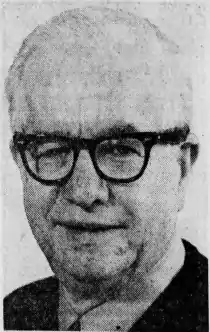Joseph T. Murphy
Joseph T. Murphy (October 21, 1910 – October 14, 1992) was an American lawyer and judge from Philadelphia.

Murphy was born in 1910 in Philadelphia's Frankford neighborhood, the son of James and Fannie Murphy.[1] He graduated from Northeast Catholic High School in 1929, a member of the school's first graduating class.[2] He later earned a bachelor's degree from Saint Joseph's University in 1933 and a law degree from the University of Pennsylvania Law School in 1936.[2] He practiced law in Philadelphia, specializing in real estate. From 1943 to 1947, he was an attorney for the United States Department of Agriculture.[2]
Murphy was also active in local Republican Party politics. He ran for city council in 1951, but finished a distant fourth in the 6th district Republican primary.[3] In 1960, Republican ward leaders nominated him for the 6th district seat in a special election following the death of Democrat Michael J. Towey.[4] Murphy pledged to fight tax hikes and public housing expansion proposed by the Democrat-led city government.[5] His run was unsuccessful as he lost to Democrat William A. Dwyer, Jr. by a substantial margin.[6]
In 1968, Governor Raymond P. Shafer named Murphy to a seat on the Philadelphia Municipal Court and he won an uncontested election to a full term the following year.[2] Governor Milton Shapp appointed him to the Pennsylvania Court of Common Pleas in 1972.[2] On that court, one of his most notable decisions was in the case of former CIA agent George Fassnacht, who was found to have a massive stockpile of munitions in his Fox Chase home. Murphy ruled that the police acted improperly when they seized the weapons without a warrant.[7]
Murphy won a retention election in 1973 for another ten-year term on the bench and spent most of his time on the court presiding over criminal cases.[2] In 1974, City Controller Tom Gola charged Murphy with borrowing firearms from evidence for personal use.[8] No charges were filed over what turned out to be a common practice on the court, but the rules were changed the following year to prevent recurrences.[2]
In 1978, the Pennsylvania Constitution was amended to require judges to retire at age 70. Murphy and four other judges in their late sixties challenged the law in court.[2] They were successful in U.S. district court, but overturned on appeal to the Third Circuit.[9] Murphy turned 70 in 1980 and took senior status on the court. He continued to hear cases until 1991. The following year, Murphy died of a heart attack at the age of 81.[2]
Sources
References
- "1940 United States Federal Census, T627_3706, page 13B". Ancestry.com. Retrieved June 6, 2017.
- "Summary of Phila. Primaries". The Philadelphia Inquirer. July 26, 1951. p. 29 – via Newspapers.com.
- "Dwyer Nominee In Council Race". The Philadelphia Inquirer. October 12, 1960. p. 6 – via Newspapers.com.
- "GOP Candidate Fights Tax Hike". The Philadelphia Inquirer. November 6, 1960. p. 38 – via Newspapers.com.
- "Democrats Retain 2 Seats in Council". The Philadelphia Inquirer. November 9, 1960. p. 7 – via Newspapers.com.
- Lame, Anthony (October 28, 1972). "Fassnacht Evidence Surpressed". The Philadelphia Inquirer. p. 1 – via Newspapers.com.CS1 maint: ref=harv (link)
- Lame, Anthony (January 5, 1974). "Gola: Judge Took Seized Guns". The Philadelphia Inquirer. p. 9 – via Newspapers.com.CS1 maint: ref=harv (link)
- Epstein, Aaron (November 4, 1980). "Judges Lose Appeal of Age Rule". The Philadelphia Inquirer. p. 3-F – via Newspapers.com.CS1 maint: ref=harv (link)
- "Phila. Judge Joseph T. Muprhy, 'hard-working, well-respected'". The Philadelphia Inquirer. October 16, 1992. p. B19 – via Newspapers.com.